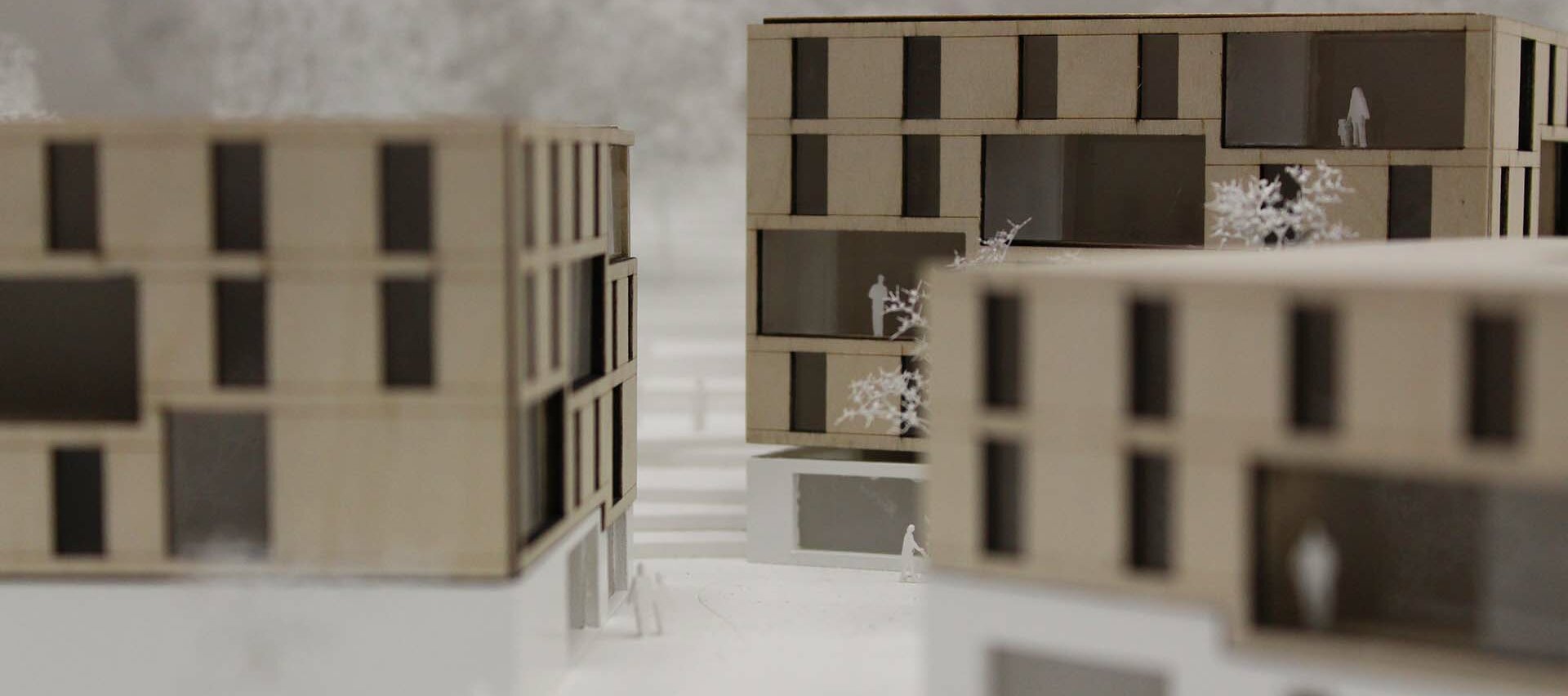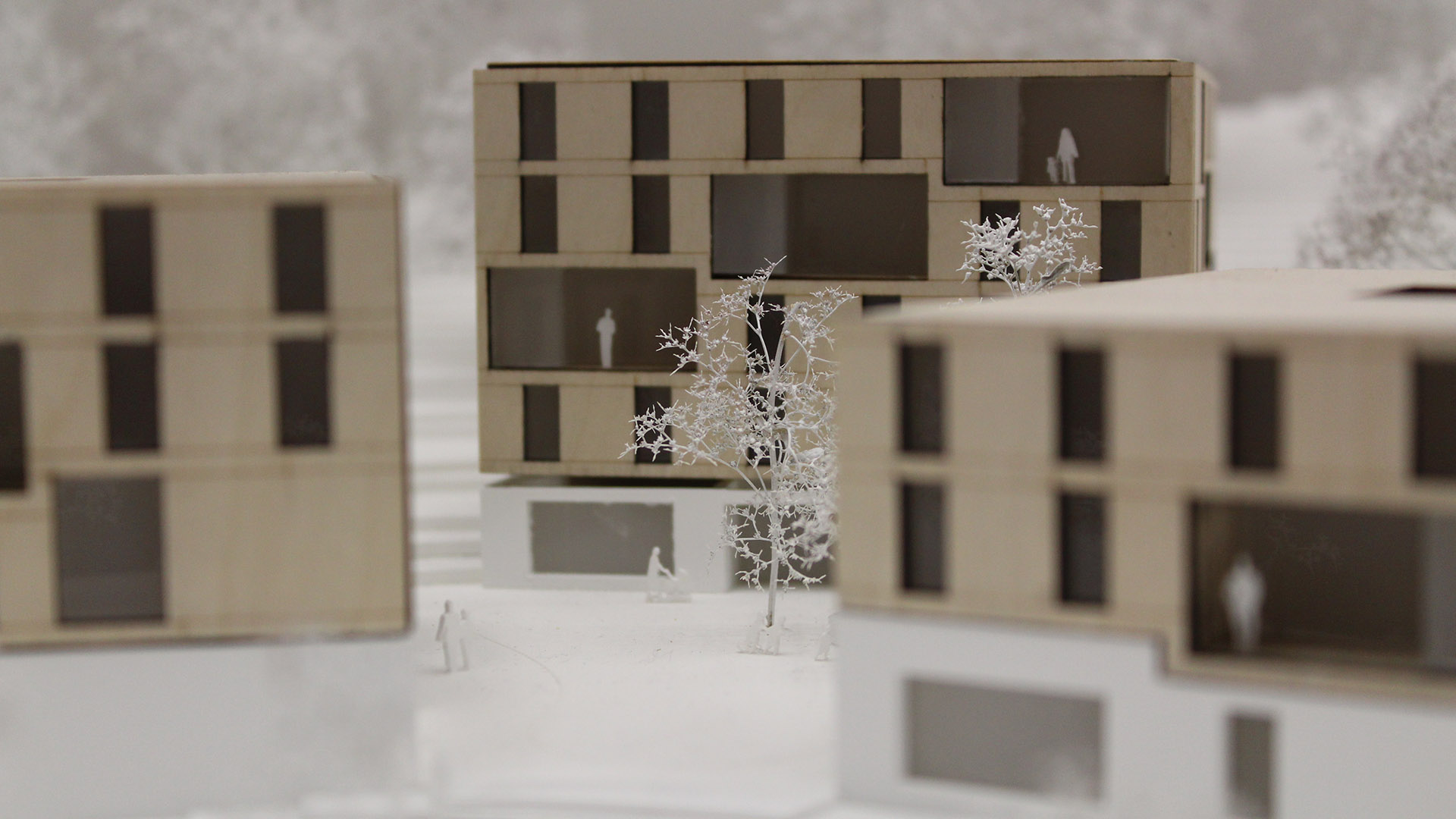Architecture B.Eng.
In the eight-semester full-time degree program in architecture, you will acquire a broad and solid foundation of knowledge in the fields of presentation and design, construction and technology, theory and history of architecture and urban planning. You will acquire conceptual, creative and constructive skills. The bachelor's degree program enables you to develop your own approach in a complex professional field in a responsible and well-founded manner.
The bachelor's degree program is oriented towards fundamentals and includes courses on theoretical and applied topics in architecture. It concludes with the final thesis and the awarding of the academic degree of Bachelor of Engineering (B.Eng.). Already with the first stage of BaA 240 ten, the recognized and established professional qualification of architects in Germany is attainable for you. In accordance with the laws governing architects in Germany, this leads to registration as an architect and authorization to submit building documents after two years of professional experience.
One of the special features of the architecture program in Mainz is the possibility of changing from the 4th semester onwards to the degree program Architecture with an integrated pracical period, which combines theoretical work at the university with practical work in an architectural firm.
In addition, provided you are qualified, you can follow up with an in-depth two-semester Master's degree program in Residential Buildingung. This offers you an attractive opportunity to specialize.
| Study program flyer architecture | |
| PDF, 2 MB | |
Degree program structure
The thorough training of your design skills forms the basis of the foundation of learning architecture. The conceptual leitmotif of the course consists of designing in alignment with constructive aspects.
In the main stage of your studies, various humanities and structural engineering disciplines will enable you to achieve a balance between theory and practice. These disciplines are accompanied by interdisciplinary projects that examine the core social issues of urbanity and the strategic management of planning and construction processes. The general and the special always confront each other. You can further deepen your interests in various elective modules.
The bachelor's degree program includes the practical project as proof of permance accompanied by the university as part of qualified and study-related practical work. Within this framework, the knowledge acquired during the studies is to be applied, deepened and adapted to practical requirements. The practical activity is intended to impart relevant knowledge, skills and experience of the professional practice specific to the degree program and to contribute to the understanding of planning, technical, economic, social and legal contexts and interactions of operational processes.
The final part of the bachelor's degree program is the bachelor's thesis, which is supplemented by a seminar. The individual students have the opportunity to prove their acquired knowledge, abilities and skills as well as their acquired key competences in the final presentation and in the colloquium.
The central program contents have a modular structure and are described in detail in the curriculum of the program. The modules are vertically and horizontally networked. The structure enables you to continuously practice design in different interrelationships. In addition to classical lectures and seminars, active work and discussion phases are also part of the training. Complex contents are discussed in group and individual discussions. The personal contact between teachers and learners is intensive.
Program Structure
| SEMESTER 1 30 ECTS | SEMESTER 2 30 ECTS | SEMESTER 3 30 ECTS | SEMESTER 4 30 ECTS | SEMESTER 5 30 ECTS | SEMESTER 6 30 ECTS | SEMESTER 7 30ECTS | SEMESTER 8 30ECTS |
|---|---|---|---|---|---|---|---|
Design | Design 10 ECTS | Design 5 ECTS | Design 10 ECTS | Design 5 ECTS | Design 10 ECTS | Design 5 ECTS | Design Project |
Construction: | Construction: Supporting Structures 10 ECTS | Construction: Supporting Structures 10 ECTS | Construction: Supporting Structures 5 ECTS | Construction: Supporting Structures 5 ECTS | Construction: | Impromptu | Excursion |
Building Materials | Building Services 5 ECTS | Building Services 5 ECTS | Energy Concepts | Pre-WWII Buildings | Construction: | Bachelor's Thesis 15 ECTS | |
History | History 5 ECTS | Urban Planning 5 ECTS | Urban Planning | History | Interior Architecture | ||
Depiction | Depiction 5 ECTS | Depiction 5 ECTS | Management 5 ECTS | Management | Elective 2 | Elective 3 | |
| Elective 1 5 ECTS | Practical Training | Elective Module |
Workshops and workstations
Semester Abroad
The degree program in architecture is globally networked with universities and academies that have a similar focus. The partner universities are located in many European countries, as well as in Chile, Jordan and Mexico. Information about partner universities and the exchange programs can be obtained from the International Office.
Universidad del Desarrollo, Concepción und Santiago de Chile (Chile)
Ecole Nationale Supérieure d‘Art de Dijon (France)
Ecole d‘Architecture de Bretagne, Rennes (France)
Ecole d‘Architecture de Lille (France)
Ecole d‘Architecture de Versailles (France)
University of Dundee (Great Britain)
Università degli studi di Roma La Sapienza (Italy)
Università di Camerino, Ascoli Piceno (Italy)
Università IAUV di Venezia (Italy)
German-Jordan University, Amman (Jordan)
Universidad de Monterrey, Mexico (Mexico)
Technische Universität Lodz (Poland)
Universidad de Sevilla (Spain)
Career Prospects
During their studies, students fill up their personal "toolbox", i.e. they acquire a number of core skills that do not commit them to a particular career. With a Bachelor's degree (B. Eng.) you have various options available to you:
- Direct career entry in an architectural firm
- A Master's degree to deepen your professional knowledge, resulting in the possibility of an academic career with a doctorate and/or a later additional qualification based on the professional experience you have acquired..
To be able to work independently and freelance, you must be a member of an architectural association. This, in turn, is also the prerequisite for holding the professional title of architect and possessing a licence to produce building documents.
For example, you can work in these professions and industries:
Architect in high-rise construction, urban planning, in the public sector (building authorities, for example), interior design, construction in existing buildings, construction management, preservation of historical buildings, building management, with property developers and housing associations, journalism, media architecture, model construction, trade fair construction, visualization.
What Mainz has to offer
The Rhineland-Palatinate capital Mainz am Rhein is strongly influenced by the students of Mainz University of Applied Sciences and Johannes Gutenberg University. The beautiful location overlooking the river, the historic old town, original pubs, small shops run by the local owners, trendy pubs, theaters and museums enliven the downtown area and contribute to the daily life of students. At the same time, numerous architectural offices in Mainz and the Rhine-Main region enable you to complete various internships and later an easy start to your career.
It is the combination of economic power, landscape diversity and a rich cultural scene that makes the Rhine-Main region particularly attractive for many people. Its central and convenient location is just as interesting for companies as it is for creative artists and students.
Who to contact
Office hours
Office
Room H 1.14
Mon, Wed, Thur, Fri: 9 am to 12 pm
Closed Tuesdays

